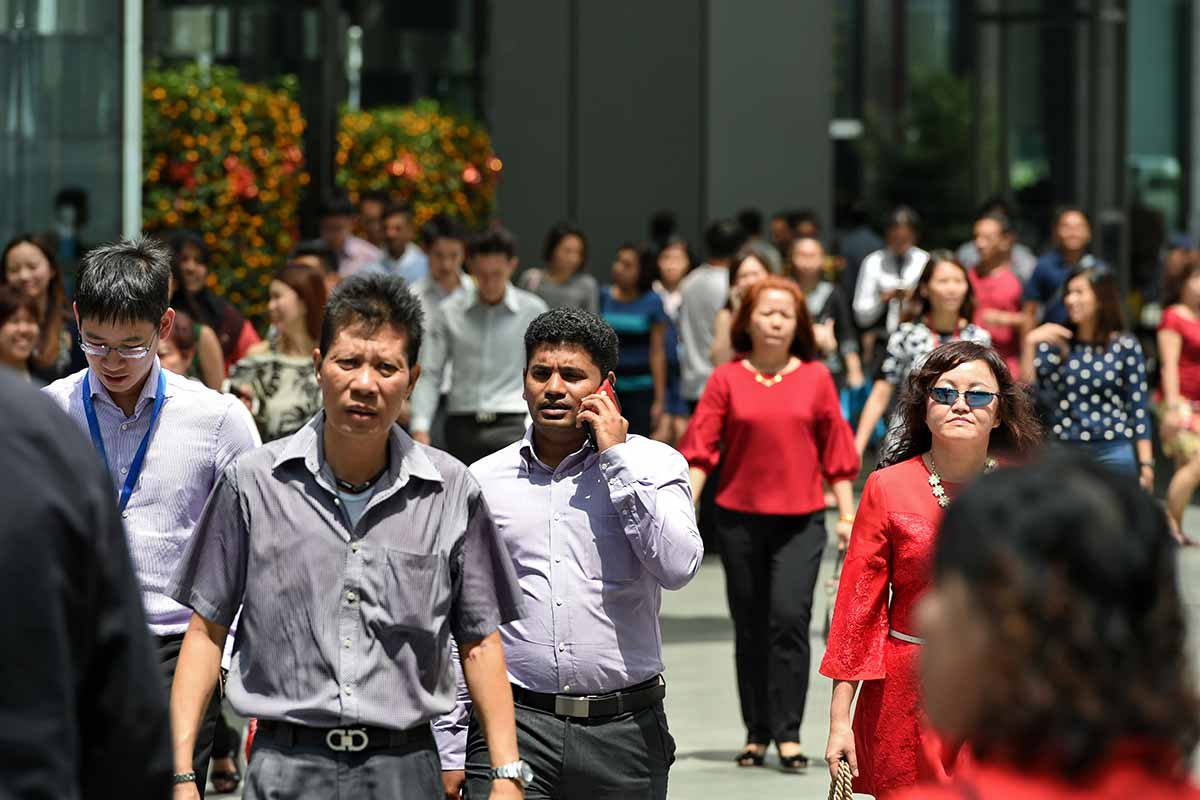While Industry 4.0, also known as the Fourth Industrial Revolution, presents a great many challenges to less developed frontier economies like Cambodia and Lao PDR, more developed countries in the region have not been spared as well. Singapore, for example, is facing a challenge precisely because of its fast-paced development.
Cisco and Oxford Economics recently analysed 433 occupations across 21 industries and noted that more full-time workers (21 percent) will probably lose their jobs in Singapore compared to other ASEAN countries. Looking at the ASEAN-6 countries (Indonesia, Malaysia, Philippines, Singapore, Thailand and Vietnam), the study revealed a correlation between a high job displacement rate and an “exceptional” environment for innovation and digital transformation.
In absolute numbers, however, the number of workers expected to be displaced in Singapore (500,000) trails the figures for Indonesia (9.5 million) and Vietnam (7.5 million), for instance.
While the study claimed that more jobs will be created because of the economic growth that comes with improved technology, it unfortunately also notes that the ASEAN workforce isn’t ready to fill in these new roles.
“Our analysis reveals that 41 percent of that 6.6 million cohort are ‘acutely lacking’ the IT skills new jobs will be demanding. Almost 30 percent lack ‘interactive skills’ that will be demanded by future vacancies — such as negotiation, persuasion, and customer service skills. Just over 25 percent also lack ‘foundational skills’ — such as active learning, reading, and writing skills that are required to a much greater extent in ASEAN’s future labour market,” the study noted.

Source: Cisco and Oxford Economics
Fastest growing jobs
Another survey found that the demand for jobs in technology that also require management and communication skills is growing the fastest in Singapore. LinkedIn analysed millions of unique, user-input job titles based on common job roles and counted the frequency of job titles held in 2013 and compared the results to job titles held in 2017.
According to the report, the top five emerging jobs in Singapore are data scientist, cyber security specialist, user experience designer, head of digital and content specialist. Jobs in data science grew at a rate of 17 times, from 2013 to 2017. Jobs in cyber security grew at a rate of 5.5 times, while jobs in user experience design grew at 3.4 times. Head of digital and content specialist jobs both grew at a rate of three times.
Cisco and Oxford Economics believe that mitigating the negative impact of technological change may require massive policy changes within education systems, adding that there is no one size-fits-all solution.
Because of the nature of the ASEAN-6 skills challenge, an integrated effort from all parties will be needed. This includes government departments, businesses, educational institutions, technology providers, and workers’ groups which will have to work collectively to provide workers with the necessary tools and skills for the transition.
Getting 4.0-ready
Recently, the Singapore National Trades Union Congress (NTUC) revealed that a wide-ranging study will be under way in the coming months to find out how Singapore's workers can be matched to future jobs. NTUC secretary-general Ng Chee Meng said this data will help define how workers can be trained even as their workplaces undergo changes.
The study will collect information from six clusters: manufacturing; built environment; trade and connectivity; essential domestic services; modern services; and lifestyle. The findings are expected to be ready a year from now.
Meanwhile, Nanyang Technological University (NTU) Singapore and Delta Electronics are opening a second laboratory space to accommodate expansion in research activities. The first lab was launched in 2016 with the support of the National Research Foundation (NRF). The second lab already has 15 projects.
Under one such project, the Smart Learning research track, the Corp Lab has developed a Smart Learning Platform that will equip professionals and enterprises with the latest Industry 4.0 skills. The platform will combine the latest information from industry and data generated from participants' learning proficiency to create a customised content package that will enhance the overall learning experience.
The Singapore government is also looking to build up local skillsets in artificial intelligence (AI) through two new initiatives, with the aim to enrol 12,000 industry professionals and young students.
One of the initiatives, dubbed AI for Everyone, is targeting to enrol 10,000 people including secondary school students and working adults and introducing them to the potential of AI technologies. The programme, offered free to the public, would be jointly supported by industry regulator Infocomm Media Authority (IMDA) and software vendor Microsoft. Chipmaker Intel also would be roped in as a content provider.
The second initiative is targeted at "technically inclined" industry professionals with the aim to train 2,000 people in basic AI competency. It would focus on software development skills for the Python platform and participants would receive a Foundation in AI certification upon completing the programme.
It’s premature to say whether Singapore will be able to meet the challenges that come with Industry 4.0 but so far there have been strong efforts by various parties. If this positive trend continues then it’s more likely than not that Singapore will welcome Industry 4.0 with a smile.
Related articles:
Thai jobs on the line if the country fails to adapt to new technologies
